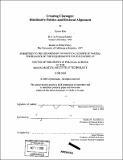| dc.contributor.advisor | Stephen D. Ansolabehere. | en_US |
| dc.contributor.author | Kim, Jiyoon, Ph. D. Massachusetts Institute of Technology | en_US |
| dc.contributor.other | Massachusetts Institute of Technology. Dept. of Political Science. | en_US |
| dc.date.accessioned | 2006-07-31T15:23:31Z | |
| dc.date.available | 2006-07-31T15:23:31Z | |
| dc.date.copyright | 2005 | en_US |
| dc.date.issued | 2005 | en_US |
| dc.identifier.uri | http://hdl.handle.net/1721.1/33685 | |
| dc.description | Thesis (Ph. D.)--Massachusetts Institute of Technology, Dept. of Political Science, 2005. | en_US |
| dc.description | Includes bibliographical references (p. 167-174). | en_US |
| dc.description.abstract | Distributive politics plays an important role for political elites for their electoral goal. Since the resources that politicians can distribute are limited, they have to decide how to distribute them in order to maximize their utility. And region becomes one of the most important yardsticks. Politicians first distribute public goods where they are supported. Economically rational voters react to what they receive and cast votes for those who have brought most benefits to them. This establishes the relationship between politicians and voters in a region, and solidifies regional voting behavior further. Therefore, regional voting is the product of politician's strategic distributive politics and rational voters' behavior. Regionalism does not only arise from economic or social cleavages that we are able to observe, but they are also intentionally cultivated. There are numerous possible reasons why regionalism started in the first place. It could have been from ethnic cleavages, unequal economic development or historical and political events that occurred in the past. However, whether or not to breed regionalism is determined by how regionalism works for the political purpose. | en_US |
| dc.description.abstract | (cont.) As in the case of Korea, regionalism has been the best political tool for political parties to decide where to focus for their electoral success. It has been used for the efficient redistribution and deepened the regional cleavage in Korea as a result. Therefore, it can be said that regionalism worked for political parties' electoral goals, which has been well received by electorates, who are interested in what they receive in return. In the second part of the dissertation, I question the claim that ethnically fragmented community is more likely to have poor fiscal policy. Scholars have raised many problems of this ethnically diversified society, and a lagged economic development and inefficient government spending are one of them. Many studies have speculated the negative effect of ethnic fragmentation on economies of scale. With a new study design, I show that previous studies on the relationship between ethnic fragmentation and provision of public goods and services can be misleading or be exaggerating the effect of ethnic diversification at most. | en_US |
| dc.description.statementofresponsibility | by Jiyoon Kim. | en_US |
| dc.format.extent | 174 p. | en_US |
| dc.format.extent | 7830539 bytes | |
| dc.format.extent | 7837846 bytes | |
| dc.format.mimetype | application/pdf | |
| dc.format.mimetype | application/pdf | |
| dc.language.iso | eng | en_US |
| dc.publisher | Massachusetts Institute of Technology | en_US |
| dc.rights | M.I.T. theses are protected by copyright. They may be viewed from this source for any purpose, but reproduction or distribution in any format is prohibited without written permission. See provided URL for inquiries about permission. | en_US |
| dc.rights.uri | http://dspace.mit.edu/handle/1721.1/7582 | |
| dc.subject | Political Science. | en_US |
| dc.title | Creative cleavages : distributive politics and electoral alignment | en_US |
| dc.type | Thesis | en_US |
| dc.description.degree | Ph.D. | en_US |
| dc.contributor.department | Massachusetts Institute of Technology. Department of Political Science | |
| dc.identifier.oclc | 64634144 | en_US |
